FOR over a century, the stoic Tommy in Frogmore Street has rested casually on his rifle as the world has rolled on by.
During his long and lonely watch horses and carts were replaced by motor cars, pictures began to move, a man walked on the moon, The Beatles came, conquered, and fell apart, and a small screen in our pockets consumed us all.
Yet through it all, the old soldier maintained his steady vigil. This symbol of stone and loss remains unblinking and unmoved through the sweltering heat of a summer’s sun and the frozen snows of a winter’s storm.
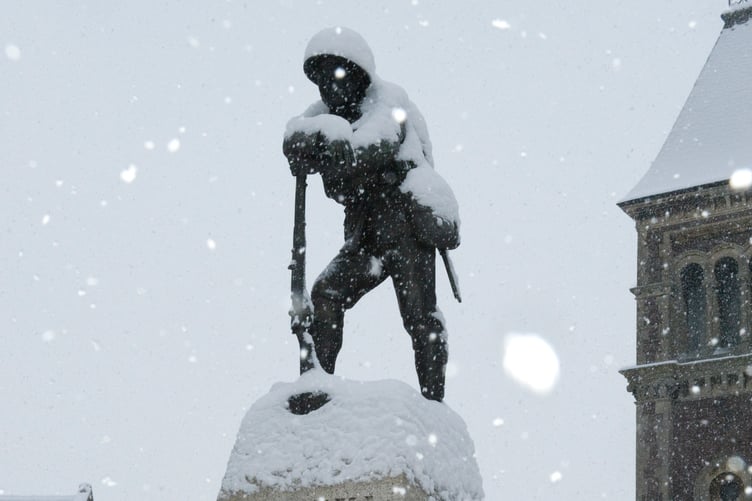
Empty midnight streets and busy crowded days are one and the same to a statue that has outlived generations and stares into a distant place no-one now alive can see or remember.
Unveiled by the Lord Lieutenant of Monmouthshire Major-General Treowen in front of a huge crowd of 50000 plus, the cenotaph has since become a part of the fabric of Abergavenny.
The timeless tribute to the soldiers of the 3rd Battalion Monmouthshire Regiment has been here for so long people forget it once wasn’t.
Created by sculptor Gilbert Ledward OBE, the lone and battle-hardened ‘Tommy’ resting wearily on his rifle, has been keeping a watchful eye on Abergavenny since 3.30 pm on October 29, 1921.
Yet behind the stony and stoic expression there lies tales of individuals who lived, died, and in whose memory the statue sands.
Rewind the clock to 7 pm on Tuesday, August 4, 1914, when the declaration of war between Britain and Germany was made and this part of Frogmore Street looked a lot different.
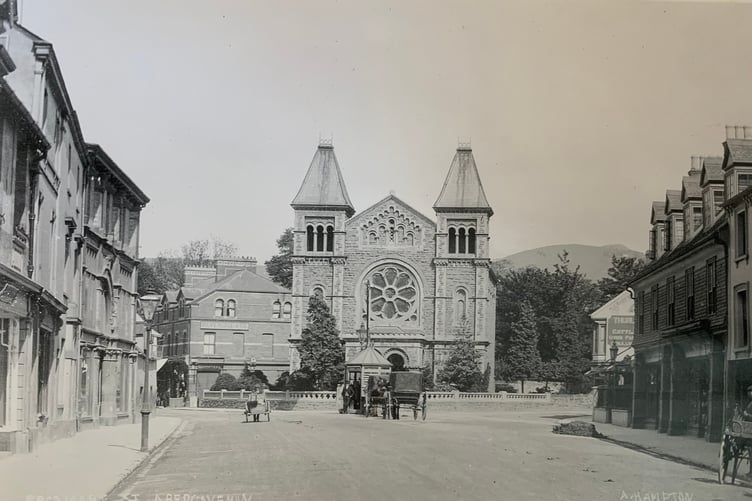
On that fateful day, the world and everything in it would be changed perpetually.
In those more innocent times, no one could guess the sheer scale of the industrial-sized carnage and horror to come.
A heady sense of patriotism, duty, glory, and optimism gripped a nation at the outbreak of war and there was no real sense of the approaching nightmare in the crowd that cheered and waved flags or the soldiers that marched.
Far removed from the reality of shell shock, slaughter, dysentery, nephritis, tuberculosis, frostbite, lack of food, sleep deprivation, nervous and physical exhaustion, filth, rotting corpses, and the ravages of no man’s land, a report in the Abergavenny Chronicle on August 7, 1914, reads, “Abergavenny, as was only to be expected of such a patriotic and loyal town, has been stirred to its very depths of feeling by the momentous conflict of rival nations. The shadow of ‘Armageddon’ has blotted out every subject but war and rumours of war. Our town has responded nobly to its country’s call, and her sons have gone forth with a fixed and grim determination to do their duty with credit to themselves and their nation.”
Mayor of Abergavenny, Alderman Z. Wheatley said during a ceremonial address in September 1914, “We are living in very critical times at present and there are various duties devolving upon the Council. Our principal duty is to do all we can to encourage men to enlist in the Army. It is a matter of life and death to us, and we must each one and all do all within our power to secure the fulfilment of Lord Kitchener’s requirements, so that he can go forward in the work of bringing success to our arms. It may not be out of place if I state what Abergavenny has done on behalf of Lord Kitchener’s Army.
“Since the 3rd of August, acting as the recruiting officer for this district, I have issued certificates for no fewer than 405 recruits from Abergavenny (applause). Then we have to think of the care and consideration of the wives and dependents of our brave men who have gone forth to fight our battles and if need be to give up their lives, and it is our responsibility to do all we can on behalf of their wives and families and other dependents.
“When we have done all these things we can surely easily have heard the call of Lord Nelson and have answered it by doing our duty.”
The men from the local area who would be doing the fighting were all part of the Third Mons.
Formed in 1908 the Monmouthshire Regiment was the county’s Territorial Army and consisted of three Battalions from different corners of the county. The Third Battalion was assembled from various companies from Abertillery, Blaina, Sirhowy, Tredegar, Ebbw Vale, Cwm, and of course, Abergavenny - a company which for years had carried the nickname ‘The bulldogs’ after a notorious strain of dog that was used for bull-baiting in the town.
The gathered companies would eventually become the 3rd Battalion, also known as the 3rd Mons.
The 3rd Mons were given the order to mobilise on the same day war broke out and soldiers from across the county caught trains to Abergavenny.
It was a glorious Summer’s day when the battalion of the 3rd Mons gathered outside Abergavenny Market Hall on August 5, 1914. Dawn was breaking and the air was full of promise. Jovial and full of high spirits the troops marched to Bailey Park for morning tea.
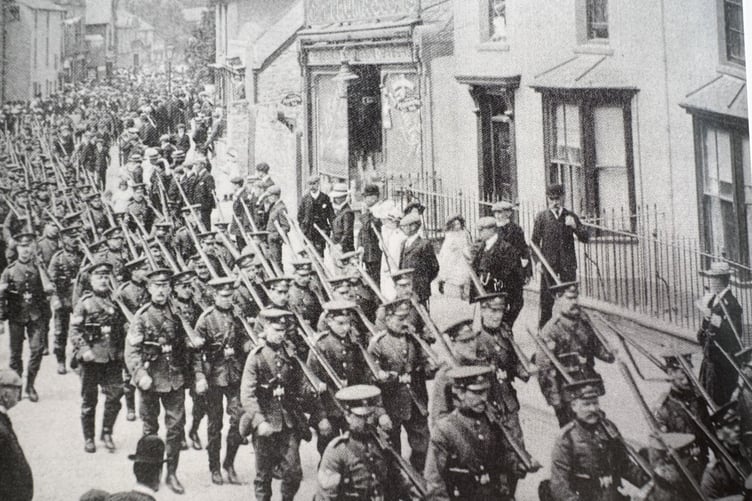
The battalion colours were handed over to the custody of the Town Mayor. The soldiers then proudly marched out of the town to the railway station as crowds cheered and flags were waved.
Sitting aboard a train bound for Pembroke Dock, many Monmouthshire men would have gazed out of the windows at the surrounding mountains.
As the Blorenge, the Sugar Loaf, the Skirrid, and the Deri faded from view, some may have even felt the first pangs of homesickness and uncertainty about the road ahead.
Most would have felt excited about what would have been seen through the optimistic eyes of a young man as the adventure of a lifetime.
That optimism was to be cruelly short-lived.

Of the 1020 soldiers of the 3rd Battalion of the Monmouthshire Regiment who had arrived in France in February 1915, many were not alive to see the dawn break on the morning of May 9.
Also known as the third engagement of the Second Battle of Ypres, the Battle of Frezenberg Ridge saw a total of 526 men from the Monmouthshire Regiment lose their lives in the killing fields of the Great War. A further 799 were wounded.
The Battle of Ypres has become notorious, not only for the terrible loss of life but also because it was the first time that the German army used poison gas on the Western Front.
During a furious and prolonged German assault, the men of the Third Battalion suffered the heaviest fatalities.
On May 8, 1915, the Monmouthshire Regiment was tasked with defending the strategic Ridge and preventing the Germans from occupying the Belgium city of Ypres and seizing the vital channel ports.
Outnumbered, outgunned, and against the odds, the Monmouthshire Battalions held fast and stood their ground. But at great cost.
By the end of the first day, 211 men had fallen. Before the engagement ended on May 13, hundreds more would join their rank
As the carnage unfolded in a terrible mass of gunfire and shelling, the Monmouthshires endured day after day of relentless German attack as they struggled to hold Frezenberg Ridge.
Prior to Frezenberg, the first engagement of Ypres was the Battle of Gravenstafel Ridge (April 22-23 1915). It was here that chemical warfare reared its ugly head for the first time and proceeded to play a monstrous part in defining the fearful symmetry of World War One.
German troops opened 5,700 gas cylinders containing 168 tons of chlorine gas and released the deadly poison to the wind.
The indiscriminate poison turned on many of the German troops who were killed and injured when carrying out the attack. However, it was the 6,000-plus French troops in the direct path of the gas cloud who were hit the worst.
The gas caused men to froth at the mouth as they died a violent and agonising death. Those who managed to survive were temporarily blinded, and as they stumbled from their trenches into no-man’s land they were mown down by enemy fire.
The use of chlorine gas allowed the Germans to advance and gain a tactical advantage.
As the battle went on the allies fashioned their own makeshift defence against the gas. They found by urinating on a piece of cloth and holding it to their face they could counter the deadly effects.
Prior to the Battle of Frezenberg Ridge, the 3rd Mons were subject to a relentless German bombardment on the evening of May 4. Casualties were high and the front line troops soon became exhausted.
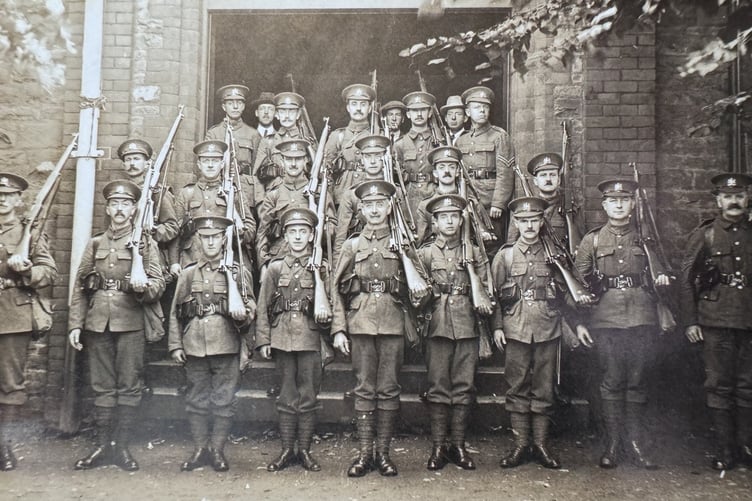
Captain O.W.D. Steel, who was a doctor in civilian life, led a company of troops to reinforce the front line. Many were cut to ribbons by the fierce German machine gun fire.
As he was leading the advance, Capt. Steel also attended to the high number of casualties. He was later awarded the Military Cross for his actions.
Private A. M. Mitchell, wrote home to commend his Captain’s courage, “Words utterly fail me to say what a hero Capt. O. W. D. Steel was during that fearful struggle. From every person I meet, they tell me the same tale. Under very heavy shell and maxim fire he went out and fetched in wounded, bandaging them and if he doesn't deserve the V.C. no man on earth ought to get it . . . I would like you to let everyone in Abergavenny know what a brave officer he is."
In a letter home, Abergavenny man Private W.B. Barry wrote, “I have been through it all right lately, I can tell you. The hottest work started on Wednesday, May 5th, when our company went into the new trenches after we retired from our old position. The Germans started to shell us at 4 o’clock in the morning, and did not stop until 8 o’clock at night, so you can see we had sixteen hours of it. It was awful. Talk about hell let loose; it was worse than that.”
After retiring to battalion headquarters, weary, worn, and with hundreds of their brothers in arms dead, the 3rd Mons were ordered to carry out a counterattack on Frezenberg.
Private Badham, of Abergavenny, wrote to a friend from the hospital, “The 8th was the day I shall never forget. They started bombarding at the same time in the morning, and about half an hour afterward we could hear a long blast of a whistle, and the attack started. We were only a handful of men, and they came on in thousands, but we kept them at bay, but I knew we would have to give way before long. The fellows on our left and right were retiring and we had orders to do the same, but we did not go until we put some more shots into them.
“It was in the retirement that we lost a lot of men. They were bayoneting our wounded that we had to leave behind. Well, we got back to our second line of trenches, and reinforcements came up. After that I don't know what happened. I went to the hospital with shrapnel in my back and a big bruise on my shoulders and the gas in my eyes."
In a letter to the father of Lieutenant Palmer, Captain O.W.D. Steel wrote, “Possibly news has reached you of the events of May 6th till May 9th. I hope I may never have to live through such days again. We are all more or less shattered, of course, and it is sheer agony to recall that black Saturday when your son met his death. I think we have all got beyond the stage of sensation and have become numb and dulled. So many officers and men have been killed or wounded that the mind is incapable of comprehending it. For this we must be thankful, otherwise, I fully believe we would become insane.”
The 3rd Mons would fight further on the front line at the notorious Hellfire Corner,” until they joined the 2nd Mons on May 27 and the official amalgamation of the battalions would take place the next day.
After fighting at Hill 60, Dickebusch, and Kemmel, The 3rd Mons would resume their identity on August 11, 1915, and see further action at the Yser Canal and of course the Somme, but by the end of the war, the battalion was no more.
In August 1916 200 men joined the 2nd Battalion and the remaining 252 men later joined the Welch Regiment and Royal Welch Fusiliers.
Yet their name and deeds have long since been immortalised in stone.
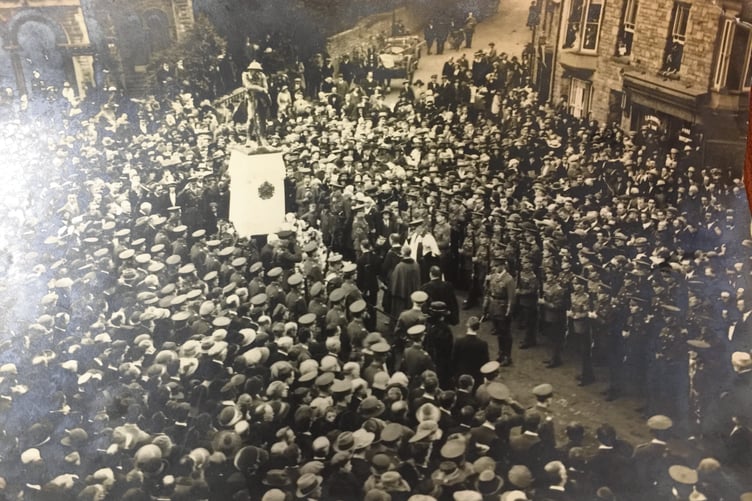
At the first gathering of many at the feet of the old Tommy, Rev. Connop L. Price read, “We dedicate this Memorial in loving memory of those who have fallen in the Great War. May their example inspire us to courage in the greater war against all evil; may their memory ever burn brightly in those who, here or elsewhere, remember their deeds, and strengthened by their fellowship look forward to reunion with them in the inheritance of the Saints in light. They whom this memorial commemorates were numbered among those, who at the call of King and Country, left all that was dear to them, endured hardness, faced danger, and finally passed out of the sight of men by the path of duty and self-sacrifice, giving up their own lives that others might live in freedom. Let those who come after see to it that their names be not forgotten.”
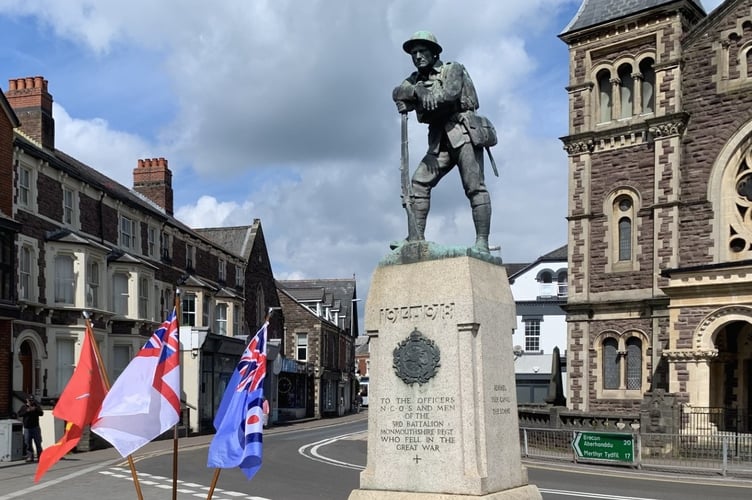
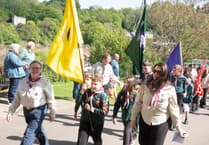

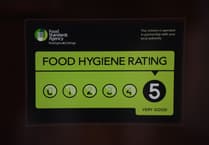

Comments
This article has no comments yet. Be the first to leave a comment.